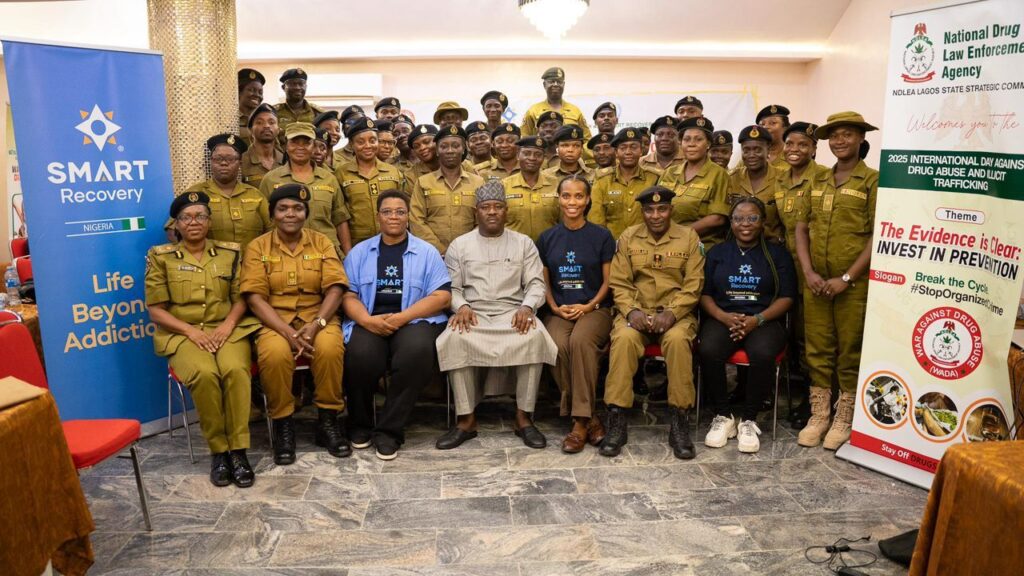A certified Addiction Medicine Physician and Clinical Director of the Resurgence Recovery Centre, Dr. Honest Anaba, has stressed the importance of drug demand reduction through prevention, counselling, rehabilitation, and public awareness—complementing the NDLEA’s enforcement efforts.
Dr. Anaba made this known during an interview with Sunday Telegraph at a two-day training programme held Wednesday and Thursday at Presken Hotel, Obafemi Awolowo Way, Ikeja, Lagos.
The training was part of activities to mark the “United Nations Day Against Drug Abuse and Illicit Trafficking.”
Themed “The Evidence is Clear: Invest in Prevention,” the event was organised by SMART Recovery Nigeria in collaboration with the NDLEA Lagos State Strategic Command and featured NDLEA personnel from all 13 area commands in the state.
Dr. Anaba noted that while supply-side efforts such as arrests and interdictions are vital, demand reduction is equally crucial for long-term success.
“Historically, NDLEA has focused on reducing drug supply. However, the agency also recognises that sustained impact requires prevention, counselling, rehabilitation, and public education. The Drug Demand Reduction (DDR) unit already delivers counselling, school-based outreach, and community engagement, but has yet to fully adopt an evidence-based mutual-support recovery model,” he said.
He added that the introduction of SMART Recovery—a globally recognised, non-12-step, evidence-based model—fills this critical gap. “This training equips DDR officers with structured facilitation skills, strengthening the agency’s rehabilitation and community outreach programmes,” he said.
According to Dr. Anaba, this initiative marks the first dedicated SMART Recovery facilitator training for NDLEA officers, forming a pilot programme expected to serve as a national model.
“We expect participants to acquire key skills in the SMART Recovery methodology, understand its four-pillar framework, and learn group facilitation techniques. Within three months, trained officers will be facilitating SMART Recovery meetings, leading to measurable improvements in client outcomes,” he said.
Each NDLEA area command is expected to develop a targeted implementation plan post-training, supported by a joint monitoring team from NDLEA and SMART Nigeria for six to nine months. High-performing officers may join the national SMART facilitator network, and the programme’s success will shape broader scale-up strategies.
SMART Recovery Global Master Trainer, Chinyere Okoro, also underscored the significance of the collaboration. “NDLEA’s presence in schools and communities makes it an ideal partner to scale addiction prevention and recovery programmes. Nigeria lacks a standardised recovery framework, and SMART Recovery is pioneering that effort,” she said.
Deputy State Commander for Drug Demand Reduction at NDLEA Lagos Command, DCN Chinyerem Eziaghighala, highlighted the programme’s relevance, revealing that the majority of clients at the agency’s Gbagada rehabilitation centre are between 22 and 25 years old.
“In Lagos, we’ve handled over 50 clients, and at least 40% are doing exceptionally well. One of our earliest clients is now studying at Birmingham University and has won several academic awards,” she said.
Eziaghighala added that two clients took the JAMB examination while in rehab last year, with one scoring 296, despite previously dropping out of three universities.
“These successes show that with recovery support, young people can regain focus and thrive academically and personally,” she noted.
SMART Recovery is an evidence-based programme grounded in Cognitive Behavioural Therapy (CBT), helping individuals overcome substance use and behavioural challenges through structured self-help and peer support.















